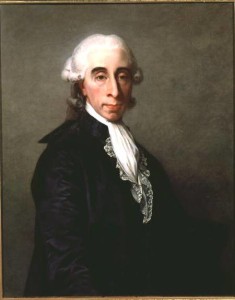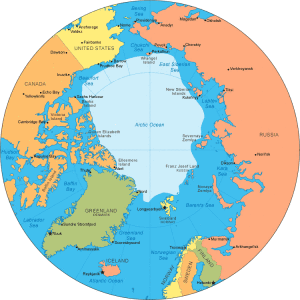Spitzbergen
Bailly, Jean Silvain
Jean Silvain Bailly (1736-1793) was born in Paris and became a renowned astronomer, in which capacity he computed an orbit for Halley’s Comet and studied the four satellites of Jupiter that were then known to science.
He was a frien d of the famous mathematician Laplace and also of Voltaire to whom he wrote his Letters on Atlantis published in 1778. In 2011, the British Library published a facsimile copy of the two volumes of the ‘Letters’ of the 1801 English translation by James Jacque of which letter #23 relates to Atlantis[926]. A modern English translation of letter #23 by Pierre Beaudry is available online(b).
d of the famous mathematician Laplace and also of Voltaire to whom he wrote his Letters on Atlantis published in 1778. In 2011, the British Library published a facsimile copy of the two volumes of the ‘Letters’ of the 1801 English translation by James Jacque of which letter #23 relates to Atlantis[926]. A modern English translation of letter #23 by Pierre Beaudry is available online(b).
>In it, Bailly proposed that the region around Spitzbergen (Svalbard) in the Arctic Sea was the location of Hyperborea and Atlantis; an idea incorrectly thought by some to have been supported by Voltaire.
“Bailly argued that Atlantis was the root civilization of mankind, which had invented the arts and sciences and civilized the Chinese, Indians, and Egyptians.” (c).
Bailly also identified Iceland as Ogygia! He managed to accommodate Plato’s voracious elephants in that Arctic region by proposing that it had a warmer climate in ancient times!<
Bailly’s view was based on a study of Nordic and Middle Eastern mythologies and his conclusions were similar to the theory of his contemporary Buffon who had suggested that the Earth had originally an interior fire that gradually cooled. While this fire burned the northern latitudes were much warmer providing an ideal environment in which Atlantis could flourish. When the fire cooled the Atlanteans moved south. Bailly suggested that this migration brought them to Mongolia and from there to the Caucasus and finally to Phoenicia.
>G.R. Carli who proposed that Atlantis, situated in the Atlantic, had been destroyed by a close encounter with a comet was strongly opposed to Bailly’s Atlantis ideas(d), which he expressed in Le Lettere Americane [087].<
Jean Baptiste Delambre was subsequently to attack the pseudo-scientific theories of Bailly, but while doing so, inadvertently misinterpreted some of Isaac Causabon’s commentary on Strabo, inferring that Aristotle rejected the existence of Plato’s Atlantis. This error was adopted by later writers and gained such widespread uncritical acceptance that this view of Aristotle became ‘received wisdom’. Thorwald C. Franke has now endeavoured to redress that situation with his 2012 book Aristotle and Atlantis[880].
Bailly got caught up in the turmoil of the French Revolution and eventually died after a kiss on the neck from Madame Guillotine. His ideas regarding Atlantis were ignored until Helena Blavatsky integrated some of his concepts into her theosophical musings. This amalgam of Bailly’s and Blavatsky’s beliefs was incorporated into the thinking of the German Thule Society which supported Adolf Hitler(a).
Around Blavatsky’s time in 1885, Dr W. F. Warren published Paradise Found [078] which also proposed that the beginnings of the human race started at the North Pole and had been inundated at the time of the Deluge.
In 1996, Joscelyn Godwin published his Arktos[789] in which he surveys the place of “the Polar Myth in science, symbolism and Nazi survival.”
(a) https://www.bibliotecapleyades.net/sociopolitica/sociopol_vril08.htm
(b) https://amatterofmind.org/Pierres_PDFs/ANCIENT_ASTRONOMY_II/BOOK_III/2._BAILLY’S_LETTERS_ON_PLATO’S_ATLANTIS.pdf (link broken) *
(d) https://arxiv.org/ftp/arxiv/papers/1609/1609.08804.pdf *
Arctic Region
The Arctic Region offers evidence of human activity as long as 45,000 years ago, 10,000 years earlier than previously thought, according to a report(f) in 2016.
Of interest to us is that Spitzbergen was proposed as the location of Atlantis by the French astronomer Jean Silvain Bailly in the 18th century. In 1885, Dr.  W. F. Warren,a former president of Boston University published a book[078]that proposed that the cradle of the human race was situated at the North Pole and had been inundated at the time of the Deluge. Warren’s book can now be accessed online(d), while a brief, but caustic, review of his theory was undertaken by Jason Colavito a few years ago(i).
W. F. Warren,a former president of Boston University published a book[078]that proposed that the cradle of the human race was situated at the North Pole and had been inundated at the time of the Deluge. Warren’s book can now be accessed online(d), while a brief, but caustic, review of his theory was undertaken by Jason Colavito a few years ago(i).
Bal Gangadar Tilak, an Indian independence campaigner, was so impressed by Warren’s ideas that in his book, Arctic Home in the Vedas [1296], he chose to locate the lost Paradise of Airyana Vaejo in the Arctic(e). The British philosopher, J.G. Bennett was sympathetic to Tilak’s ideas and proposed their further investigation, while being more dismissive of Warren’s reasoning(j).
More recently Gene Matlock also claimed that the Garden of Eden had been situated at the North Pole(h).
Modern Russian nationalism seems to have adopted some of the dafter notions of Nazi Germany including the idea of an Aryan master race, from which they claim to be descended, that was formerly located in the Arctic. It was revealed in 2016 that a former Nazi base had been discovered in the Arctic, which had been used to search for ancient artefacts(g).
Such ideas are expounded by the new darling of Russian neo-fascism, Alexander Dugin, who likes to blend nationalism with mysticism. It is rather worrying that some elements of this nationalism have also adopted anti-semitism as part of their rhetoric(b).
More recently Professor Sergey Teleguin has again drawn attention to Tilak’s work in an article that identifies elements in the Mayan Popul Vuh, which suggest that its origins were in the far north, in Ultima Thule. He concludes with the thought that perhaps the Indo-European and Mayan ancestors came from the true North Pole! Teleguin has outlined his ideas further in an article for (Nov/Dec 2013) Issue 102 of Atlantis Rising magazine.
>In 1906, the American explorer, Robert Peary, made a failed attempt to be the first to reach the North Pole. On his return, he claimed that he had seen a previously unknown, massive landmass complete with soaring mountains and deep valleys, which he called Crocker Land after one of his sponsors. His story received a mixed reception, but another well-known explorer, Donald Baxter MacMillan, took Peary’s account at face value and organised an expedition to find Crocker Land, that set out in July 1913. Where Peary’s attempt was a failure, MacMillan’s was a disaster that ended in murder. Needless to say, Crocker Land was not found, as it does not exist in the Arctic any more than Atlantis does. The story is a fascinating read(k).<
(b) Archive 2415)
(d) https://www.sacred-texts.com/earth/pf/index.htm
(e) https://archive.org/details/in.gov.ignca.9566/page/n7/mode/2up
(f) https://www.sciencemag.org/news/2016/01/grisly-find-suggests-humans-inhabited-arctic-45000-years-ago
(h) http://www.viewzone.com/edenpole.html
(i) http://www.jasoncolavito.com/blog/was-the-garden-of-eden-at-the-north-pole
(k) The Quest for the Mysterious Lost Atlantis of the Far North | Mysterious Universe *
